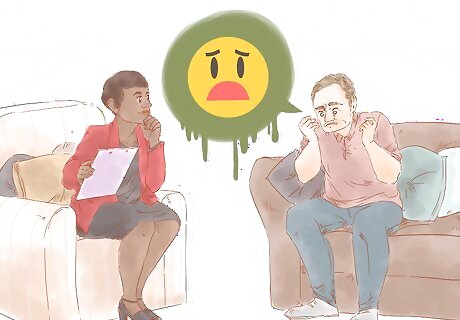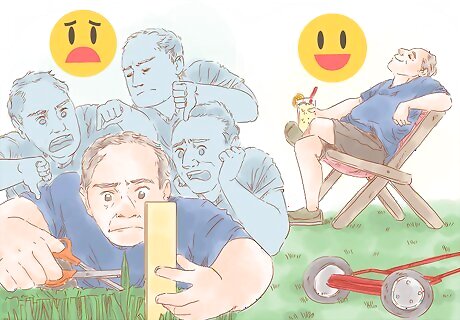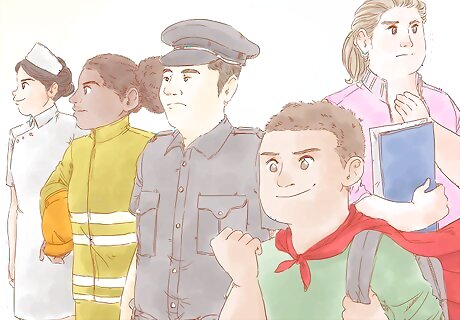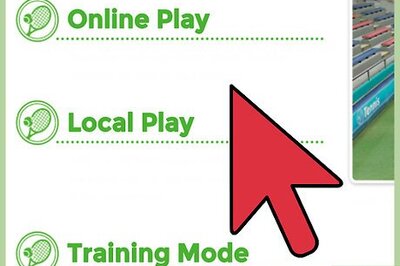
views
Accepting Where You Are

Admit that you're scared. Bravery doesn't mean that you're never afraid — it means that you're afraid, but you move forward anyway, even in the scariest moments. When you try to push emotions away, they often just become stronger. Instead, acknowledge that you feel the way you feel. You will be able to better deal with your emotions when you're honest about them. Say it out loud. Verbalizing what you're afraid of can bring it out into the open and make it seem more ordinary. You don't have to say it to anyone else, just to yourself. You can also try journaling. Write privately, but honestly, about what you're feeling. Stay away from judging yourself — it isn't helpful to say things like, “I'm such a coward.” Focus on what you are feeling in the moment without judging it: “I am feeling afraid of the surgery I have to have tomorrow.”

Validate your feelings. You should understand that your emotions are normal. Fear originates in the amygdala, a region in your brain sometimes called your “lizard brain” because it deals with primal emotions, and everyone experiences it. Judging yourself for your feelings isn't helpful, and it won't lead to bravery. It can be helpful to read stories by people who have faced their fears and overcome them. This can help you understand that you aren't alone in feeling afraid, which can make it easier for you to accept this emotion in yourself.

Name your fear. Sometimes, we aren't even sure what we're afraid of. That uncertainty can increase anxiety, which then makes us feel even more afraid. Take some time to identify what may be causing these feelings of fear. You may find that self-reflection is helpful. Try being as specific and detailed as possible. For example: “I'm feeling afraid. I feel it everywhere in my body. I feel nauseated. I don't know why I'm afraid right now. Things that could be causing this fear could be my worry about my partner's health, or my concern about keeping my job, or feeling like the Lakers aren't going to win the championship this year.” You may also find it helpful to talk with a mental health professional. Many people believe the myth that therapy is only for people who have huge, insurmountable problems, but this isn't true at all. If you consistently have trouble being afraid, a therapist or counselor could help you identify why and come up with strategies to address it.

Examine your fears. We tend to be afraid when we perceive some harm or threat to ourselves (or others). Some fears are legitimate, but others do more harm than good. Take a good look at your fears and decide whether you think they're helpful or harmful. For example, being afraid of skydiving when you have never had a lesson is a reasonable fear. You don't have any training or skills in that area and could get hurt. However, you could address this fear by taking lessons and learning more about skydiving. You might still feel a tinge of fear when you're up in the plane, but you will have taken all the actions that you can control. On the other hand, being afraid to finish writing your book because you're afraid of how others will judge it isn't really helpful. You don't have control of others' reactions, but you can control what you do. In this case, the only thing holding you back is fear itself. Your fears may also manifest as unchangeable and global. Take a step back and examine them. For example, “I'm just not brave enough to travel on my own” assumes that your fear is inherent and permanent. Instead, focus on what you can do to overcome that fear: “I am afraid to travel on my own. I can do research about the place I travel to so I feel more comfortable when I get there. I can take self-defense classes so I feel stronger.”

Accept vulnerability. A common reason we're afraid is because we worry about being vulnerable. With vulnerability comes the possibility of uncertainty, hurt, or risk. However, being vulnerable also opens you to love, connection, and empathy. Learning to accept vulnerability as a fact of life can help you worry less about your fears. One way to be brave is to accept that everything is a risk. All the things you do in a day — from getting out of bed to eating dinner — carry some level of risk. But that doesn't stop you from living your life. Neither should the things you're afraid of. The fear of failure is another very common fear. Try to think of things not in terms of failure or success but in terms of what you can learn from them. This way, all things are helpful in some way, even if it isn't in the way you expected.

Focus on what you can control. You can't help being afraid of something — it's an emotional response you can't change. However, you can control what you do about it. Keep your attention focused on your actions, not your involuntary responses. Remember that you also can't control the outcomes of any action. You can only control what you do. Let go of the idea that you “have” to control how any action turns out — you simply cannot control this. Focus on your actions, not their results.
Building Your Confidence

Find a role model. If you're having a hard time seeing your way out of a situation, try modeling your behavior after someone else who's faced adversity. Not only can this give you a good dose of perspective ("Wow, at least my problem isn't as bad as that"), it might inspire you to be more courageous. Look for a role model among people you already know. If you feel comfortable enough, consider asking them how they dealt with situations that required bravery. Read about brave historical figures. Look up the life stories of people who are renowned for facing adversity with bravery, such as Theodore Roosevelt, Harriet Tubman or Joan of Arc, freedom fighters, rebels, etc.

Develop mental resilience. Bravery requires you to be “tough” when you encounter scary or difficult situations. Mental resilience is more than just a tough front, though. To be truly resilient, you need to practice the following: Flexibility. Cognitive flexibility is the ability to adapt to changing situations. It's the ability to stay away from defensiveness if something goes wrong. It's the ability to look for new ways to approach a problem or situation. You can develop flexibility by recognizing the potential for learning in all situations, and by developing a mindset of curiosity rather than worry. Engagement. In order to be brave about a situation, you have to face it head-on. Truly brave people examine the situation and identify how to approach it, rather than trying to run away or ignore the problem. Breaking down a situation into smaller elements can help you face troubling situations. You can also try to imagine the best possible scenario, rather than the worst possible one. Persistence. Things may not always go smoothly. Brave people understand this and get back up when they fall down. You can help yourself become persistent by defining what actions you need to take every step of the way. It's much easier to face a setback if you know that the next step you need to take is achievable, rather than a monumental task.

Challenge negative thoughts. We all get stuck in unhelpful ways of thinking, or “cognitive distortions,” from time to time. When you find yourself thinking negative thoughts about yourself or a situation, challenge yourself to examine what evidence you really have for these thoughts, or reframe them in positive terms. Generalizing is a common distortion. For example, “I'm such a coward” is a generalizing statement about yourself that isn't true. You may experience fear, but that doesn't make you “a coward.” Refocus onto what you're feeling in the moment. For example: “I am feeling afraid about this big date tomorrow because I'm nervous that my date won't like me.” This will help you avoid holding unhealthy (and inaccurate) beliefs about yourself. Catastrophizing is another distortion that can cause fear responses. When you catastrophize, you blow an event or experience out of proportion until it spirals out of control. For example: “My boss didn't look at me when I passed her in the hall. She's probably mad at me. I've probably done something wrong. She might fire me. I'll lose my house.” This obviously is a worst-case scenario that's extremely unlikely to happen. Challenge these thoughts by requiring yourself to examine the evidence for each stage of your assumption. For example: “My boss didn't look at me when I passed her in the hall. She could be angry with me. She could also be distracted by something else. She may not have even seen me. Assuming she's angry with me doesn't make sense; I'll ask her if everything is all right before I get too upset.”

Reject perfectionism. Perfectionism is the culprit behind many fears. We may be so afraid that our efforts won't be “perfect” that we don't even attempt them. It's a common myth that perfectionism is the same as healthy ambition, or a drive for excellence. In reality, perfectionism tries to keep us from ever experiencing loss or failure — and that just isn't possible in life. Perfectionism can cause you to be so harsh on yourself that you view things that are really accomplishments as “failures” because they don't live up to your unreasonable standards. For example, a perfectionist might consider earning a B in history a “failure” because it isn't a perfect grade. A student who is fair to themselves could view it as a success, because they worked as hard as they could in the class. Focusing on your process, rather than its outcomes, can help you beat perfectionism. Perfectionism can often lead to a sense of shame in yourself because it focuses only on your flaws. It's very difficult to show courage if you're ashamed of yourself. Perfectionism also doesn't lead to success. In fact, many people who identify themselves as perfectionist are less successful than people who embrace the possibility of setbacks and view them as learning experiences.

Start every day with self-affirmations. Self-affirmations are phrases or mantras that are personally meaningful to you. You can repeat them to express kindness and acceptance to yourself. Although it may sound cheesy, self-affirmations can actually help boost your confidence over time. For example, you might say something like “I accept myself today for who I am” or “I am worth love.” You can also focus your self-affirmations on developing your courage. For example, you can say something like “I can be brave today” or “I am strong enough to handle whatever today throws my way.” Remember to keep your self-affirmations focused on, well, yourself. Remember that you can't control others. For example, a helpful self-affirmation could look like this: “I will do my best today to manage my fears. I can't do more than my best. I can't control how others act or respond to me.” Phrase your self-affirmations in a positive way. Humans respond negatively to negative statements, even if they're meant to be helpful. Instead of saying “I will not give in to my fears today,” say something like “I can face my fears today because I am strong.”

Distance yourself from your fears. Sometimes, it can be helpful to view your fears as something separate from yourself. Visualizing your fear as a separate creature can help you feel more in control of it. For example, you could imagine that your fear is a little turtle. Whenever it's afraid, the turtle pulls its head inside its shell and can't do or see anything, which obviously isn't helpful. Visualize your “fear turtle” and confront it, telling it that you are doing what you can control and not worrying about what you can't. Using humorous or comical imagery may take some of your fear's power away by making it ridiculous. (It worked in Harry Potter, right? Riddikulus!)

Ask your friends for help. Sometimes, a word of encouragement from a friend or loved one can help you when you're feeling less-than-brave. Surround yourself with people who are also committed to vulnerability and bravery, rather than those who allow fearful thoughts to dominate them. Humans are susceptible to “emotional contagion.” It turns out that, just like you can catch a cold, you can also “catch” emotions from the people around you. It's important to surround yourself with people who are accepting and courageous themselves. If you hang out mostly with other people who are terrified of something (and aren't doing anything to manage that fear), you may have more trouble overcoming your own fear.

Attempt difficult tasks. Succeeding in something that you find challenging can give you a boost in self-confidence. Even if you don't immediately get the hang of your undertaking, treat the challenge as a learning experience and remind yourself that you can take as much time as you need to learn. For example, you could set a goal to learn the guitar, cook a gourmet French meal, become certified in scuba diving — the only limit is your imagination. Set goals and attempt challenges that are personally meaningful to you. A surefire way to damage your self-confidence is to compare yourself constantly to others. Don't worry what anyone else thinks about your goals; do them for you.

Practice mindfulness. One reason many people struggle with courage is that we want to avoid feeling sad, angry, or frustrated, so we “tune out” of the suffering that we and others experience. Practicing mindful acceptance of the present experience, without judgment, can help you accept negative emotions as well as the positive ones, which can help you feel braver. Mindfulness meditation can be an excellent way to practice these skills. You can take a class in it, or teach yourself. UCLA offers several downloadable guided meditations. UCSD also has downloadable MP3 meditation guides. Harvard Pilgrim's “Mind the Moment” program has a free course and practice videos for mindfulness practice.
Practicing Bravery Every Day

Practice accepting uncertainty. Uncertainty is the source of many fears. However, you can learn to tolerate uncertainty by gradually working it into your daily experience. This will increase your confidence and ability to handle uncertain situations, which will allow you to act with bravery. “Intolerance of uncertainty” causes a lot of anxiety. You may find it hard to accept that something negative may happen in a situation. You may overestimate the risks of a situation or avoid acting because you are worried about the consequences. Keep a journal throughout the day, noting when you feel uncertain, anxious, or afraid. Write down in specific detail what you think is causing these feelings. Also note how you respond to them in the moment. Rank your fears. Place the things you're afraid of or anxious about on a scale from 0-10. For example, “Going on a date with a stranger” might be an 8, while “going to a movie I've never seen before” might be a 2. Start slowly learning to manage your fear of uncertainty by practicing in low-risk settings. For example, pick one of the fears you've ranked lower, like “trying a new restaurant,” and practice it. You may end up hating the restaurant, and that's okay. The important thing is to prove to yourself that you can face uncertainty with bravery and come out stronger on the other side. Record your responses in your journal. Every time you face a fear, record what happened. What did you do? What did it feel like to do it? How did you respond to those feelings? How did it turn out?

Make specific plans. It's easy to feel afraid when you don't know what you need to do. Break down challenges and situations into smaller tasks that you can achieve. Envisioning the possible roadblocks you may encounter can help you act courageously when you run into difficulty. Think about any obstacles you might face and create a plan of action to deal with them. Word your plans and goals in positive language. Research shows that you're more likely to achieve your goals when you frame them positively as something you're working toward, not what you're working away from. Keep your goals performance-based. Remember that you can only control your actions and responses, not anyone else's. Make sure to set goals and make plans that you can accomplish through your own work.

Choose to help others. When you're afraid or stressed, your natural tendency may be to hide away from the world. However, psychological research suggests that this isn't the most helpful way to boost your courage. Many people display a “tend-and-befriend” tendency, where you react to a stressful situation by expressing care for others. Expressing care for others activates a state of bravery in your brain that can carry over into your own situations. The next time you're feeling fear, try to show someone else compassion or honor their strength. You may find your own increases too. When the social caregiving system, regulated by the neurotransmitter oxytocin, is stimulated, you experience greater empathy and connection with others. This system also inhibits the areas of your brain that process fear. The reward system in your brain releases a powerful neurotransmitter called dopamine that increases your sense of motivation and decreases your sense of fear. Dopamine can make you feel more optimistic and courageous. The attunement system in your brain relies on the neurotransmitter serotonin. Your self-control and intuition are linked to serotonin, meaning you feel more able to make brave (and smart) decisions.

Be brave for 20 seconds. Sometimes, it's too hard to imagine being brave for a whole day, or even a whole hour. Practice being brave for just 20 seconds at a time. You can do anything for only 20 seconds. When you've finished the first set, start another. And another. And another. These little chunks add up.

Consider your decision. If you're facing a situation that might mean making a brave but difficult decision, take some time to think it over. If you feel strongly about what needs to be done, you can use that to help boost your courage in the moment. Conviction is a major factor in courage. Ask yourself: Is this the right thing to do? The right thing isn't always the easiest, nor the most popular. Rely on your conscience to help you decide. Is this the only way to resolve the situation? Consider whether there are other ways to get around your problem. Is there a workaround you haven't thought of yet? Are you prepared to face the consequences? If the action you're about to do has huge consequences, take an extra second to think about it. If the worst-case scenario happened, would you be able to handle it? Why you are making this decision? Why is it important to you? What will happen if you don't make it? You could also make a list of pros and cons for each course of action you can take. What's really the worst that could happen? What's the best that could happen?

Don't think — act. After a certain point, it's better if you stop dwelling on what you're about to do and just do it. Overthinking not only can talk you out of taking action, it can stress you out and make you feel like you can't do anything. Take a deep breath, try to clear your mind, and go forward with what you've already decided on. Don't hesitate, and focus on just getting through it. It can help to repeat your affirmations while you're taking this action. Confidence is important to getting you through the first step. As you continue to act, you'll continue to feel braver.

Fake it till you make it. Learning to tolerate the uncertainty and discomfort of certain situations is just that — a constant learning experience. You won't be brave overnight. But research has shown that “putting on a brave face,” even when you're not feeling brave, can help you become braver. Don't wait until you “feel” brave. Often, even people we think of as courageous — firefighters, soldiers, doctors — don't feel brave in the moment. They just know what has to be done, and they choose to do it. On the flip side, believing that you can't do something is likely to become a self-fulfilling prophecy. Your belief in yourself can either help or hinder your performance.



















Comments
0 comment